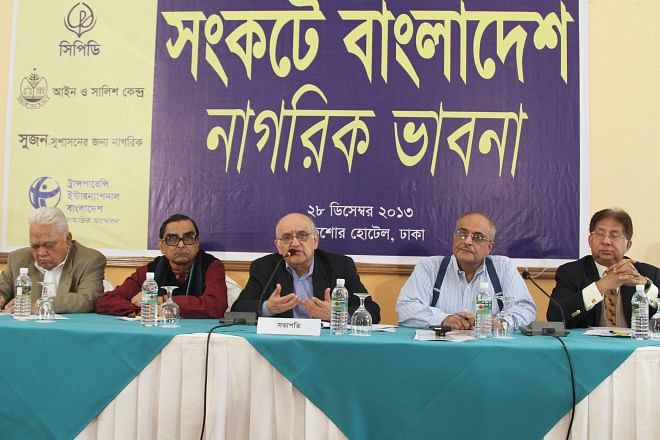Defer Jan 5 polls

Eminent citizens yesterday called on the government to defer the January 5 parliamentary election to make it participatory and credible.
Deferment of such a meaningless election is the main task now to hold dialogue among major political parties and resolve the ongoing crisis, they told a discussion at a hotel in the capital's Gulshan.
Civil society think-tank Centre for Policy Dialogue (CPD), legal aid organisation Ain O Salish Kendra, civic movement for good governance Sujan and Transparency International Bangladesh (TIB) jointly organised the discussion on “Bangladesh in Crisis”.
Renowned jurist Rafiqul Haque said the January 5 polls can be deferred up to 90 days even after the dissolution of the ninth parliament within the constitutional framework.
As per constitution, parliament members must be directly elected by the people, he pointed out, but 154 candidates have already been elected uncontested to the tenth parliament.
Two top leaders of the Awami League and the BNP must realise that the national interest is far above their partisan interests, and they have to engage in dialogue after deferment of the election to sort out the nature of election-time government, added Rafiqul.
There is no constitutional bar to holding the 10th parliamentary election within 90 days after the dissolution of the current parliament, said Asif Nazrul, professor of law at Dhaka University.
Elections have to be free, fair and inclusive for the legitimacy of a democratic government, said Prof Rehman Sobhan, chairman of CPD.
Referring to the February 15 general election in 1996 without the participation of the major opposition party, he said, “Let's not repeat the same follies that can be averted.”
Criticality of the situation is deteriorating day by day. So both the leaders of the AL and the BNP have to sit in dialogue with patriotism for the sake of democracy and public welfare leaving their partisan whims aside, he added.
“We don't want the January 5 election,” said Syeda Rizwana Hasan, executive director of Bangladesh Environmental Lawyers Association.
Both the opposition and ruling party leaders are turning a blind eye to the risks they are creating for the people and democracy with their obstinate political stances, said Dr Iftekharuzzaman, executive director of TIB.
Deferment of such a meaningless election is now a demand of majority people, said former adviser to a caretaker government Hossain Zillur Rahman.
Prof Abdullah Abu Sayeed, chairman of Bishwa Sahitya Kendra, said both the major political parties are dictatorial. It is easy to oust a military dictator, but extremely difficult to unseat an elected dictator.
Prof Anisuzzaman, a supernumerary professor at Dhaka University, said bloody violence, arson and sabotage in the name of political programme have devastated public life, economy and education. So the top leaders of the two major parties must sit for a cordial dialogue.
Manzur Elahi, former adviser to a caretaker government, warned that the country might head to extremism unless the two major political parties reach an agreement.
Barrister Mainul Hosein said the 15th amendment to the constitution is intended to establish a one-party rule and it is an impossible task to hold multi-party elections keeping this amendment in the charter.
Mahfuz Anam, editor and publisher of The Daily Star, said what is meant by general election is not going to happen on January 5.
“The constitution envisages that the voters will elect their representatives through direct elections to parliament. But what is going to happen in the January 5 election goes against the very spirit of the constitution,” he said.
With 154 out of 300 parliament members already elected uncontested and elections to the rest of the seats without participation of the opposition parties will virtually result in the entire 10th parliament elected uncontested, he added.
Such elections will bring even worse political confrontations and cause loss of lives and public property, he said, and the Election Commission, which has already lost credibility, should also be reconstituted.
He suggested that the people must be resolute in making sure that such elections are not held. Instead, the ninth parliament, which is still in force, should convene a session to sort out who should head the all-party election-time government, maybe with the help of the president.
Moderated by distinguished fellow of CPD Dr Debapriya Bhattacharya, the discussion was addressed by Farooq Sobhan, president of Bangladesh Enterprise Institute, Rokia Afzal Rahman, president of Metropolitan Chamber of Commerce and Industry, among others.

 For all latest news, follow The Daily Star's Google News channel.
For all latest news, follow The Daily Star's Google News channel. 



Comments